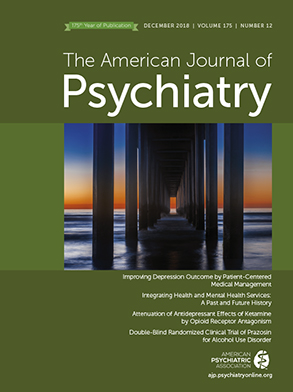T
o the E
ditor: In the August 2018 issue of the
Journal, Tiihonen and colleagues (
1) explored an important yet unresolved area concerning antipsychotic discontinuation in the treatment of first-episode schizophrenia. Because this was a nonexperimental study, the presence of systematic bias due to confounding variables was not surprising. The confounding effect of a significantly different frequency of clozapine use among users and discontinuers was apparent in one of the supplementary tables in the article. A chi-square analysis using a 2×2 contingency table would reveal values of 38.6, 25.6, 12.3, and 4.2, respectively, for comparisons between the four groups of users and discontinuers (i.e., <1 year, 1–<2 years, 2–<5 years, and ≥5 years). All of these values are significant at the level of p<0.05. The frequency of clozapine use was overrepresented in the users. Higher consumption of clozapine might be a proxy for higher severity or greater treatment resistance. Both of these variables could potentially confound the results. This would be an example of confounding by indication, in which the indication (treatment resistance) or severity is related to both the exposure (antipsychotic use) and the outcome (relapse or rehospitalization). The second measured but unaccounted for confounding effect stemmed from the inclusion of subjects with schizoaffective disorder. Compared with schizophrenia, schizoaffective disorder may have better outcomes (
2). The authors could have mentioned and compared the number and distribution of subjects with schizoaffective disorder among the users and discontinuers to examine the effect of this potential confounder.
Another likely confounding effect that is known to influence the risk of relapse in schizophrenia but was not measured in this study is history of substance abuse. A meta-analysis in patients with first-episode psychosis, consisting of 29 studies with at least 12 months of follow-up, showed that persistent substance use disorder increased the odds of relapse by threefold (
3). The odds of relapse were lower than those due to treatment nonadherence but higher than all other potential predictors of relapse. We believe that information regarding substance use status was available and that the authors could have included the same. Other factors, such as poor premorbid adaptation to school and social withdrawal, could predict relapse, but these are difficult to measure through medical records (
4). Nevertheless, the authors could have mentioned these in their discussion of limitations of the study.
One of the ways to estimate the effects of confounders is to calculate the variance in a multivariate regression analysis. The predictive value of even a highly significant covariate is judged to be low if the variance is small. In a Cox regression analysis, measurement of variance is difficult. In their article, Schemper and Henderson (
5) proposed a model of estimating the predictive accuracy of covariates (risk factors) in a Cox proportional hazards model. There are other models as well (
6). Had the authors of the present article used any of these models, the predictive accuracy of the risk factor (antipsychotic discontinuation) could have been measured. Influence of confounders could have been indirectly inferred from the predictive accuracy. In our opinion, in this kind of cohort study with a large number of unmeasured and unknown confounding effects, quoting only the hazard ratio (with confidence intervals) and the significance level is not enough.

